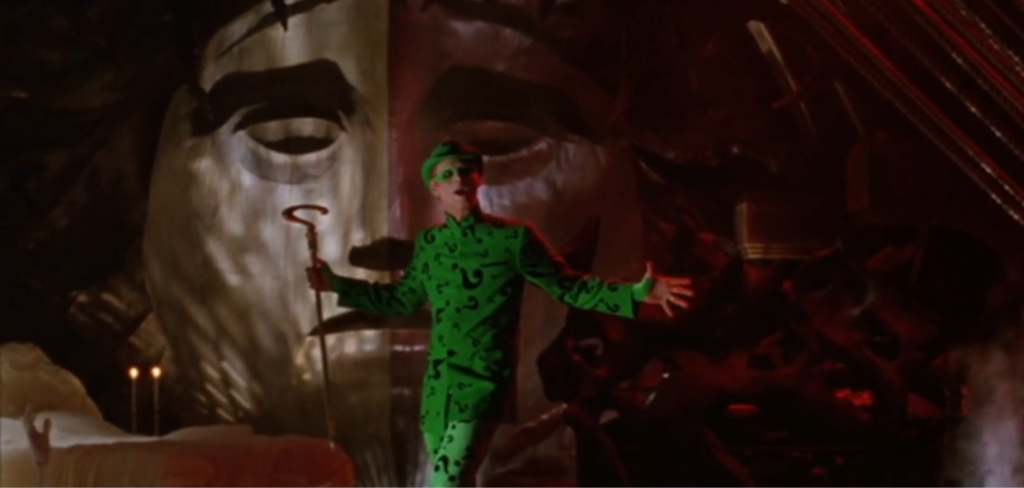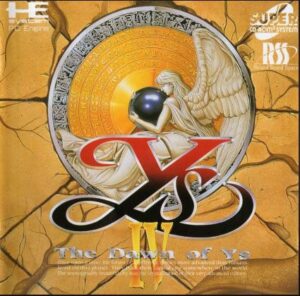Despite Batman Returns becoming a financial success worldwide, it was subject to harsh criticism stating that it was too dark for a Warner Brother’s film. These criticisms would change the course of Batman films forever. A sequel to Batman Returns was greenlit for production, but Warner Brothers made major changes on the production side. Tim Burton was moved from the director’s chair into a producer role, and directive control was handed over to the late Joel Schumacher. These changes drastically changed the look and feel of the third film. As a result, Batman Forever was a significant tonal departure from past installments.

Released in June of 1995, Batman Forever was written by Lee Batchler and Janet Scott Batchler, with the score provided by Elliot Goldenthal. The film starred Val Kilmer as Batman, Tommy Lee Jones as Harvey Dent “Two-Face,” and Jim Carrey as Edward Nygma “The Riddler.” Nicole Kidman and Chris O’Donnell also made appearances. The plot is as follows: When Two-Face, a former attorney turned crime lord, and the unhinged Riddler join forces to conquer Gotham, Batman alone will not be able to save the city. To defeat these villains, he will need some help. It is time for the dynamic duo.

Warner Brothers demanded that this film have two villains, and the concept is executed better here than it is in the next film, Batman & Robin. Aside from having two villains, however, Batman Forever adopts a lighter tone than both of its predecessors, which is reflected in both the performances and the set design. One aspect of the film that I found off-putting is that it tries to replicate Burton’s tone with mixed results. While the movie tries to stay true to past installments, the new production team makes it feel very different. It is almost as if the creators are trying to restrain themselves from making the film they truly want to make, which is undoubtedly due to studio meddling from Warner Brothers. (Unfortunately, that is going to be a reoccurring trend, particularly once we hit DCEU.)

Goldenthal’s score is serviceable, yet it pales in comparison to Elfman’s work on the previous films. Another shortcoming of Batman Forever is its overreliance on CGI. This makes the film feel more dated than Batman 1989 and Batman Returns, which aged better due to their use of practical effects.

Batman Forever marks the only appearance of Val Kilmer as the Dark Knight. (Keaton departed the series over script disagreements with Schumacher, and Kilmer would also leave the role after this film to be replaced by George Clooney in the following installment.) As for the other characters, let’s just say the performances of Jones and Carrey as Two-Face and the Riddler wouldn’t be out of place in a Saturday morning cartoon. However, what these characters lack in depth they at least make up for in enthusiasm. Chris O’Donnell’s Robin is cocky and self-assured, which is reminiscent of the original Batman comics, in which Dick Grayson loves to run his mouth canonically.

It is quite easy to see Warner Brother’s heavy-handed involvement in this film’s development. They wanted to produce a more family-friendly movie so they could make a higher box office and merchandise profit. During its theatrical run, Batman Forever grossed $152 million worldwide, ranking second only to Toy Story that year. Ironically, Batman 1989 was more successful at the box office.

Overall, it’s important to remember that Batman Forever was very much influenced by studio meddling. The film went through quite a developmental process on the cutting room floor, as Warner Brothers cut 40 minutes from the official run time, bringing it down from 2 hours and 40 minutes to 2 hours. I don’t think it is a bad movie. It just feels like it wasn’t allowed to reach its full potential. I don’t want to discount the work of Schumacher and his production team; they did their best to bring us a film that is still enjoyable despite being very limited in creative control. It doesn’t quite capture the feel of Batman like the Burton movies did, but it still is an enjoyable watch, which is more than I can say for the next film…




